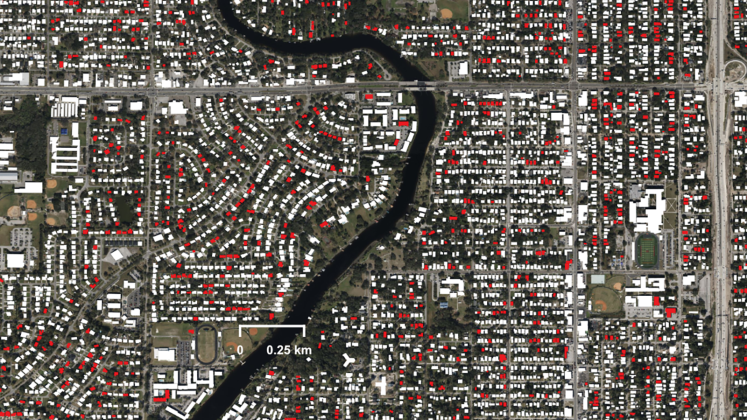Richmond Hill, November 26, 2024—A new analysis by the United Nations University Institute for Water, Environment, and Health (UNU-INWEH) reveals alarming statistics about the catastrophic impacts of Hurricane Helene on September 26, 2024. This powerful Category 4 hurricane claimed 230 lives, marking it as the deadliest storm to hit the mainland U.S. since Hurricane Katrina in 2005. The destruction was immense, with over 31,000 buildings affected and a staggering $12.5 billion in threatened property value across the hardest-hit regions.
"Our analysis demonstrates how outdated infrastructure and expanding development in high-risk areas amplify the impacts of extreme weather events," said Dr. Manoochehr Shirzaei, UNU-INWEH's Land Subsidence Analytics Lead who led this investigation. "Our findings highlight the urgent need for investment in resilient infrastructure and improved land-use planning," added Shirzaei, who also serves as an associate professor an associate professor of the Department of Geosciences and National Security Institute of Virginia Tech.
The Incident Brief published by UNU-INWEH highlights how the interplay between the local management decisions and the global climate change magnified the hurricane's impact. Cities like Asheville, Black Mountain, and Chimney Rock in North Carolina; Greenville in South Carolina; Steinhatchee and Tampa in Florida; and Valdosta in Georgia bore the brunt of Helene’s wrath. Synthetic aperture radar (SAR) analysis of satellite data by the authors of the Incident Brief revealed that between 14% and 25% of buildings in these areas suffered significant damage, underscoring the vulnerability of existing infrastructure in the U.S. to similar natural disasters and climate extremes. Many of the affected areas were in flood-prone zones, where poor urban planning and aging infrastructure exacerbated the devastation.
The authors, including scientists from UNU-INWEH and Virginia Tech, underscored the urgent need for a comprehensive, multi-disciplinary approach to disaster preparedness and resilience. They emphasized that strengthening infrastructure, enforcing stricter building codes, and implementing evidence-based policies are critical to mitigating the risks of future extreme weather events. The brief also highlights the role of global climate change, noting that warming atmospheric conditions have increased and will continue to increase the frequency and intensity of severe hurricanes like Helene. However, the report also points to local factors, such as rapid urbanization, poor management, and encroachment into floodplains, which have amplified the damage caused by natural disasters.
Prof. Kaveh Madani, Director of UNU-INWEH and a co-author of this publication, emphasized the importance of integrating advanced technologies, cutting-edge research, and climate adaptation strategies to build resilience. He called for urgent action to address the vulnerabilities exposed by Hurricane Helene, stating, "This disaster is a stark reminder that we must rethink how we develop our communities and prepare for the growing threats posed by climate variability. Once again, we learned that our cities, even in advanced economies are not ready to deal with extreme climatic events. Climate change is a catalyst here and should not be an excuse to overlook the bad decisions made at the local scale."
The authors are hopeful that their analysis can serve as a wake-up call for policymakers, urban planners, and communities to adopt adaptive measures that account for both global and local drivers of disaster risk. They believe that by learning from the lessons of Hurricane Helene, societies should appreciate the urgency of the problem and take significant steps toward addressing the outstanding threats and building a more resilient future.
Download the Incident Brief
Helene disaster: The threat of poor management and climate change to human lives and assets
Media Contacts
Kyra Bowman, UNU Head of Communications bowman@unu.edu
The UNU research team is available for interviews
Dr. Manoochehr Shirzaei, Land Subsidence Analytics Lead, UNU-INWEH, manoochehr.shirzaei@unu.edu
Prof. Kaveh Madani, Director, UNU-INWEH, kaveh.madani@unu.edu
Incident Brief Information
Shirzaei, M., Sadhasivam, N., Werth, S., Lucy, J., Etzler, W., Matin, M., Madani, K. (2024). Helene Disaster: The Threat of Poor Management and Climate Change to Human Lives and Assets, United Nations University Institute for Water, Environment and Health (UNU-INWEH), Richmond Hill, Ontario, Canada, doi: 10.53328/INR24MSIR001.




